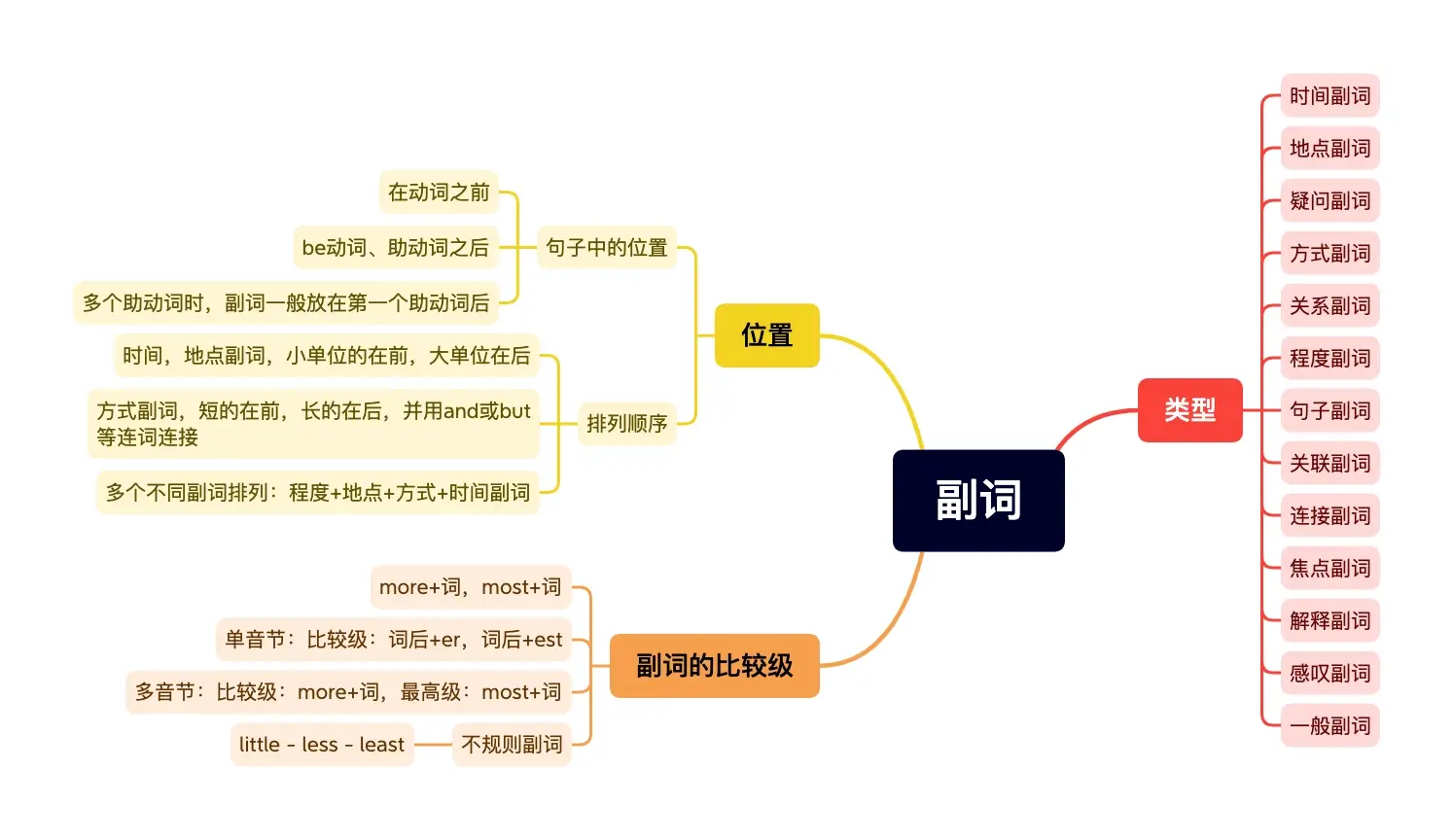在英语学习中,基础语法的扎实程度直接决定着英语学习的各个方面,包括英语听力、英语口语、英语阅读、英语写作和英语翻译等方面,前面我们跟大家分享了:英语基础语法:形容词分类、形容词的用法和形容词的级(2)、英语基础语法:形容词分类、形容词的用法和形容词的级(1)和英语基础语法:英语中的动词及动词分类,今天跟大家分享副词的用法。

副词分类和副词的基本用法
副词的概念
副词是指在句子中表示行为或状态特征的词,用来修饰动词、形容词、其他副词、介词短语、非谓语动词乃至整个句子,表示时间、地点、程度、方式等概念。文章源自西贝博客-https://qinghe.me/adverb.html
修饰形容词文章源自西贝博客-https://qinghe.me/adverb.html
- What he said is roughly true.
- 他的话大致是对的。
修饰副词文章源自西贝博客-https://qinghe.me/adverb.html
- He speaks English quite fast.
- 他英语讲得不错。
修饰动词文章源自西贝博客-https://qinghe.me/adverb.html
- He absolutely supports me.
- 他绝对支持我。
修饰介词短语文章源自西贝博客-https://qinghe.me/adverb.html
- Much to my amazement, he speaks pretty good English.
- 颇令我惊讶的是,他英语讲得很好。
副词与助动词连用时,应置于助动词之后文章源自西贝博客-https://qinghe.me/adverb.html
- He says he will always love me.
- 他说他会永远爱我。
 文章源自西贝博客-https://qinghe.me/adverb.html
文章源自西贝博客-https://qinghe.me/adverb.html
副词常见后缀
在形式上,许多副词带有后缀 -ly,有些则与形容词等其他词类似。文章源自西贝博客-https://qinghe.me/adverb.html
形容词同形
有些副词有两种不同的形式,一种与形容词同形,一种由形容词加后缀 -ly构成,形容词和副词同形,需要根据其在句中的句法功能和上下文意义,判断其词性;
- Everything went pretty smoothly. 一切都进展得相当顺利。
- The work place is pretty quite. 办公环境非常安静。
-ly
有时,带 -ly或追与否,在意义上有着明显的差别。而且,不带 -ly 的副词只能放在动词之后,而带 -ly 的副词位置则较灵活,可以在动词之前,也可以在动词之后;
- He is deeply compunctious for his outburst.
- 他为自己的大发雷霆深感懊悔。
-wards
有些副词是由介词或地点名词加后缀 -ward(s) 构成的,意为“向...”;
backward(s) 向后地
forward(s) 向前地
upward(s) 向上地
downward(s)向下地
- The child is backwards in her studies.
- 这个孩子功课落后了。
-wise
有些副词是由名词加上后缀 -wise 构成,表示位置、方向、状态等;
clockwise 顺时针地
sidewise 向一边地
lengthwise 纵向地
- He sat very far back and sidewise without any saddle.
- 他坐在很靠后的地方,没有鞍。
-ways
有些副词以后缀 -ways 结尾
lengthways 纵长地
sideways 向一边地
- The boy gave the girl a sideways look.
- 这男孩斜视了那姑娘一眼。
a-
有些副词是以前缀 a- 为特征的
alike 同样地
abroad 在国外
alone 独自地
aloud 高声地
- I've no money—we all share and share alike in camp.
- 我没有钱——我们都得在营地里分享一切。
常用副词举例
1、very much
(1) very 可修饰一般副词或形容词
- They do things very carefully.
- 他做事很小心。
(2) much 可修饰比较级的形容词或副词
- She gets much better than before.
- 她比以前好多了。
(3) much、far、a lot、a great deal 也可修饰 too
- It's too hot today.
- 今天太热了。
(4) very 与 much 也可用以修饰作形容词用的分词,用法如下:
a、凡是作形容词用的现在分词或过去分词(即可译成"...的"),之前可被中文"很"修饰时,则可与 very 连用
- I'm very confused on this issue.
- 对于这件事,我非常困惑。
b、much 则用以修饰译成“受到...的”的过去分词
- He was (very) much hurt.
- 他伤得很重。
2、little、a little
(1) little 作副词时,译成“几乎一点儿都不”,极接近"no"之意
- John's Chinese is little better than mine.
- 约翰的日语比我好不到哪里去。
- = John's Chinese is no better than mine.
(2) a little 也可作副词,表“有点儿”,修饰形容词或副词
- He handles things a little carelessly.
- 他处理事情有点儿马虎。
3、sometime、some time、sometimes、a few times
sometime 不知何时,找个时候(与明确的时间连用)
- We'll see you sometime next week.
- 我们下周找个时间来看你。
some time 一段时间
- I have seen learning English for some time.
- 我英语学了一段时间了。
sometimes 有时候
- I go to the movies sometimes/on occasion/occasionally/(every) now and then.
- 有时候我会看电影。
表示“有几次”,不说 some times,而说 a few times
- He has been to China a few times.
- 他曾去过中国几次。
4、already、yet
(1) already 表示“已经”,只用于完成时或一般过去时的肯定句中
- He has already arrived.
- 他已经来了。
(2) yet 则为强调的副词,多用于完成时的疑问句或与 not 连用的否定句中
- He hasn't arrived yet.
- 他尚未到达。
(3) yet 也可与 have to 连用,形成下列结构
Have yet to do 尚未...
- He has yet to finish the report.
- 他尚未写完报告。
- = He hasn't finished the report yet.
(4) as yet 截止目前为止
- As yet I have finished two reports.
- 截至目前为止我写完了两份报告。
- = So far I have finished two reports
5、instead、instead of
instead 是副词,表“相反地”,置于句首时,instead 之后置逗号。 instead 也可置于句尾
- He didn't do to Shanghai. Instead, he went to Hangzhou.
- 他没到上海去,相反地他去杭州了。
6、ago、before
(1) ago 表“从现在算起若干时间以前”,时态用一般过去时
- I saw him five hours ago.
- 我五小时之前见过他。
(2) before 则表“从过去某时算起若干时间以前”,时态用过去完成时
- He came here on Friday. Just two days before, an earthquake had occurred here.
- 他星期五来这里,就在来的前两天,这里曾发生地震。
7、good、well
(1) good 是形容词,表“好的”、“不错的”,置于名词前,用以修饰名词;或置于 be 动词之后,作表语
- He speaks good English.
- 他的英语讲得很好。
- = His spoken English is good.
- (2) well 是副词,表“很棒地”,置于句尾,用以修饰动词
He speaks English (very) well.
(3) well 也可作形容词,表“身体好的”、“健康的”
- I don't feel well; I guess I've caught a cold.
- 我身体不舒服;我想我感冒了。
(4) good 与 and 连用,可作副词,等于 very,修饰形容词
- I'm good and tired.
- 我累坏了。
- = I'm very tired.
(5) well 也可置于过去分词之前,修饰该分词,形成复合形容词
- He is well-bred.
- 他很有教养。
类似的复合形容词有:
well-organized 很有组织的
well-educated 受过良好教育的
(6) well 也可置于句首,形成下列固定句型
- Well goes the saying, "Honesty is the best policy.
- " 俗语说的好,“诚实是上策”。
- = As the saying goes, "Honesty is the best policy."
- = Ad the saying puts it, "Honesty is the best policy."
- = "Honesty is the best policy." , so goes the saying.
8、there、here
there 或 here 置于句首时,结构若为“主语 + 不及物动词”,则应改为“不及物动词 + 主语”
- There goes the train.
- 火车走了。
9、downstairs、upstairs、here、there、home
以上词类均为副词,不可与介词连用
- On my way home, I ran into a friend of mine.
- 我回家途中与一位老友不期而遇。
10、so that...,so... that...
(1) so that... 这样的话...
使用本连词时,所引导的状语从句应有助动词 can、may、will 等
- Work hard so that you can pass the test.
- 要用功,这样你才能成功。
- = Work hard in order that you can pass the test.
- = Work hard so as to pass the test.
- = Work hard in order to pass the test.
(2) so ... that ... 如此...以致...
由于 so 是副词,故之后应置形容词或副词,以供修饰。实际使用时,常将 that 省略
- He is so nice that I like him.
- 他人这么好,所以我很喜欢他。
- = He is so nice I like him.
(3) such ... that ... 如此的... 以致...
由于 such 是限定词(形容词),之后应置名词
- He is such a nice guy that I like him.
- 他是这么一个好人,所以我很喜欢他。
(4) in case 万一
- Take an umbrella with you (just) in case in rains.
- 随身带把伞以防下雨。
- = Take an umbrella with you in case of rain.
11、enough
enough 可作形容词,表“充分的”,使用时置于名词前,修饰该名词
- I still have enough money left.
- 我剩下的钱仍有不少。
enough 也可作副词,使用时应置于形容词或副词之后,采用后位修饰
- He is good enough for the job.
- 他条件不错,足以胜任这份工作。
12、near、nearby、close、nearly
near 是介词,表“靠近”
- He lives near the school.
- 他住在学校附近。
close to 表“靠近”
- My school is close to where I live.
- 我的学校靠近我住的地方。
- = My school is near where I live.
nearby 在附近
- There is a department store nearby.
- 附近有一个百货公司。
nearly 几乎
- Nearly one third of my classmates passed the test.
- 差不多我的三分之一的同学通过的测试。
13、before、after
before 或 after 之前可置 soon、shortly、immediately 或 long 修饰
- Long before he was a soldier, he had worked as an English teacher in our school.
- 早在他当兵以前,他曾在本校任职英语老师。
14、respectfully、respectably、respectively
respectfully 满怀敬意地
- We treat the hero respectfully.
- 我们满怀敬意地对待这位英雄。
respectably 值得尊敬地
- A real hero does things respectable.
- 真正的英雄做事正派。
respectively 分别地
- I gave the three children an orange respectively/each.
- 我给这三个小孩一个一个橘子。
15、later
latter 与 the 连用,形成代词,表示“后者”
- John and Peter are good friends. The former is a teacher, while the latter is a soldier.
- 约翰和彼得是好友,前者是老师,而后者是军人。



评论